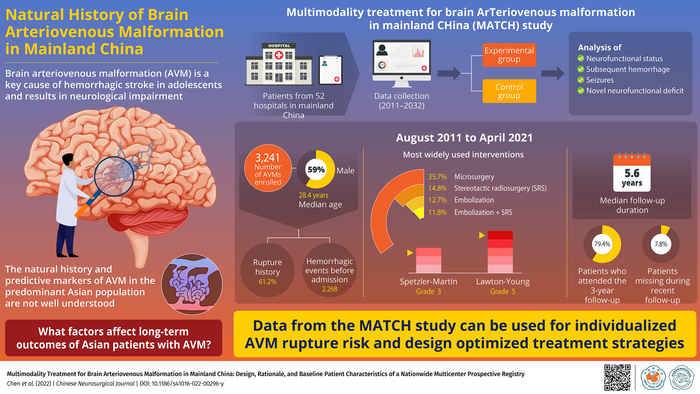Brain arteriovenous malformation (AVM) is the abnormal entanglement of arteries and veins in the brain, which disrupts the normal flow of blood and can lead to hemorrhage, seizures, and neurological impairment in affected individuals.

Credit: Drs. Xiaolin Chen and Yuanli Zhao from Department of Neurosurgery, Beijing Tiantan Hospital, Capital Medical University
Brain arteriovenous malformation (AVM) is the abnormal entanglement of arteries and veins in the brain, which disrupts the normal flow of blood and can lead to hemorrhage, seizures, and neurological impairment in affected individuals.
Ruptured AVMs are highly fatal and require immediate medical intervention. However, the treatment options for ruptured and unruptured AVMs are ambiguous. Thus, there is a need to personalize treatment protocols depending on disease severity. Although multiple studies have been conducted to investigate AVMs, its natural history in the Asian population is poorly understood.
To this end, a team of researchers led by Dr. Xiaolin Chen and Dr. Yuanli Zhao from the Department of Neurosurgery, Beijing Tiantan Hospital, Capital Medical University, China is conducting a nationwide, prospective study—the Multimodality treatment for brain ArTeriovenous malformation in mainland CHina (MATCH) study—to investigate common factors affecting the treatment strategies and long-term outcomes of AVMs in the Asian population. The study is ongoing since August 2011 and is expected to conclude in April 2032.
“We wanted to understand the history of AVMs in mainland China and identify investigative predictors of AVMs in the residing population—an area that has not been studied extensively,” remarked Dr. Chen while discussing the motivation behind this study, the latest findings of which were published on October 17, 2022, in volume 8, issue 33 of the Chinese Neurosurgical Journal.
MATCH is a nationwide registry of consecutive AVM patients from 52 hospitals in mainland China. First, the team collected detailed clinical information of enrolled patients diagnosed with AVM. Based on disease severity, they developed a standardized treatment protocol, which included interventions such as microsurgery, embolization, stereotactic radiosurgery (SRS), multimodal treatment, and conservation. Based on the type of treatment received, patients were divided into experimental and control groups.
Next, the team examined the efficacy of different treatments on these patient groups and assessed them for neurological indications and medication after 3 months, 1 and 2 years, and 3 years.
As of April 2021, 3241 patients with AVMs were enrolled as part of this study. An astonishing 59% of them were male with a median age of 28.4 years. Moreover, a significant number of these patients had a history of AVM rupture and hemorrhagic incidents, with median Spetzler-Martin and Lawton-Young grades of 3 and 5, respectively. Microsurgery was the most popular treatment choice overall, while a combination of SRS and embolization was the most popular choice among multidisciplinary treatment options. The response was promising with 79.4% of patients completing their 3-year follow-up assessments.
These findings indicate that categorizing treatment strategies for AVM based on disease severity-based is an ideal approach. A hopeful Dr. Chen muses,” Our study will explore the superiority of multidisciplinary comprehensive assessments, promote the formulation of individualized treatment protocols and precision medicine in the management of AVMs in the coming years.”
We wish the team the best in their noble endeavor!
***
Reference
DOI: https://doi.org/10.1186/s41016-022-00296-y
Authors: Yu Chen1, Heze Han1, Li Ma1, Ruinan Li1, Zhipeng Li1, Debin Yan1, Haibin Zhang1, Kexin Yuan1, Ke Wang1, Yang Zhao2, Yukun Zhang2, Weitao Jin2, Runting Li1, Fa Lin1, Xiangyu Meng3, Qiang Hao1, Hao Wang1, Xun Ye1, Shuai Kang1, Hengwei Jin3, Youxiang Li3, Dezhi Gao4, Shibin Sun4, Ali Liu4, Shuo Wang1,5, Xiaolin Chen1,6, Yuanli Zhao1,5
Affiliations:
1Department of Neurosurgery, Beijing Tiantan Hospital, Capital Medical University,
2Department of Neurosurgery, Peking University International Hospital, Peking University,
3Department of Interventional Neuroradiology, Beijing Tiantan Hospital, Capital Medical University,
4Department of Gamma‑Knife Center, Beijing Tiantan Hospital, Capital Medical University,
5China National Clinical Research Center for Neurological Diseases,
6 Stroke Center, Beijing Institute for Brain Disorders.
About Professor Xiaolin Chen
Professor Xiaolin Chen is an Associate Professor at the Department of Engineering and Computer Science, Washington State University, Vancouver. Her research expertise lies in the areas of computational mechanics, Multiphysics analysis, finite elements, boundary elements, modeling and characterization of advanced materials and MEMS structures, modeling, and simulation in biomedical research. Prof. Chen has an impressive number of publications, that have been extensively cited by researchers across the world.
About Professor Yuanli Zhao
Professor Yuanli Zhao is the Chairman of the Department of Neurosurgery at the Beijing Tiantan Hospital, Beijing, China. He has held many respectable positions throughout his career. His area of expertise encompasses cerebral arteriovenous malformations, arteriovenous malformations, Moyamoya disease, and brain aneurysms. Prof. Zhao has over 221 publications in highly reputed journals to his credit, that have been cited extensively.
Journal
Chinese Neurosurgical Journal
DOI
10.1186/s41016-022-00296-y
Method of Research
Experimental study
Subject of Research
People
Article Title
Multimodality treatment for brain arteriovenous malformation in Mainland China: design, rationale, and baseline patient characteristics of a nationwide multicenter prospective registry
Article Publication Date
17-Oct-2022
COI Statement
The authors declare that they have no competing interests




